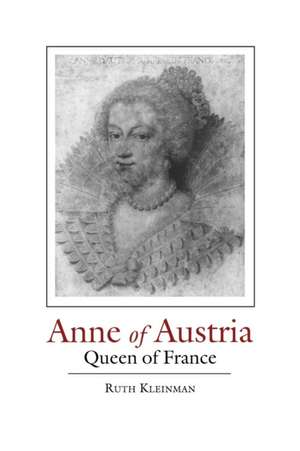ANNE OF AUSTRIA: QUEEN OF FRANCE
Autor RUTH KLEINMANen Paperback – 31 ian 1987
Preț: 331.67 lei
Nou
Puncte Express: 498
Preț estimativ în valută:
63.47€ • 65.86$ • 53.05£
63.47€ • 65.86$ • 53.05£
Carte tipărită la comandă
Livrare economică 18 martie-01 aprilie
Preluare comenzi: 021 569.72.76
Specificații
ISBN-13: 9780814204290
ISBN-10: 0814204295
Pagini: 368
Dimensiuni: 152 x 229 mm
Greutate: 0.57 kg
Ediția:1
Editura: Ohio State University Press
Colecția Ohio State University Press
ISBN-10: 0814204295
Pagini: 368
Dimensiuni: 152 x 229 mm
Greutate: 0.57 kg
Ediția:1
Editura: Ohio State University Press
Colecția Ohio State University Press
Recenzii
“The first scholarly biography of the woman who was the wife of Louis XIII and the mother of Louis XIV. Traditionally, scholars have dismissed Anne as almost a nonentity—lazy, fat, stupid, and of little influence in the government. Kleinman offers convincing revisions of each of these assumptions.”
—Choice
—Choice
“This bright, never sluggish biography by a professor of history reconstructs Anne’s difficult marriage and her trying times as regent for her young son immediately after the death of her husband. Kleinman’s account is important historiographically, for it establishes the heretofore rather indistinct Anne as a definite figure of quality and of consequence in the maintenance of the French monarchy; it will also prove enticing for general readers of royal biographies, for it is exceptional in depicting how royal lives were led in the seventeenth century.”
—Booklist
—Booklist
Notă biografică
Ruth Kleinman is Professor of History at Brooklyn College of the City University of New York.
Extras
Adapted from the Preface: Wife of Louis XIII, Mother of Louis XIV and regent for her son during his youth, she deserves to be called Anne of France rather than Anne of Austria. Much that has been written about her by historians is less revealing of her than of the writers’ own political preoccupations and historical tastes, or about the changing fashions in historiography. What has been missing up to now is a portrait of Anne as she was: a woman who certainly had faults but who also had the strength to survive difficult circumstances, to go beyond what she had been taught, and to adopt a new allegiance. It is quite true that Anne did not usually act directly or independently, and that she did not spend her time reading dispatches—she was not trained for it. Her upbringing had fitted her to be a royal wife and mother, not a queen ruling in her own right; and when she had to act in political matters, she was content to act through men. But biology itself can become a political matter, and in her love for her firstborn son, she learned to take advice, overcome old prejudices, and give up old loyalties—all for the sake of handing on to him intact the state his father had left him.
